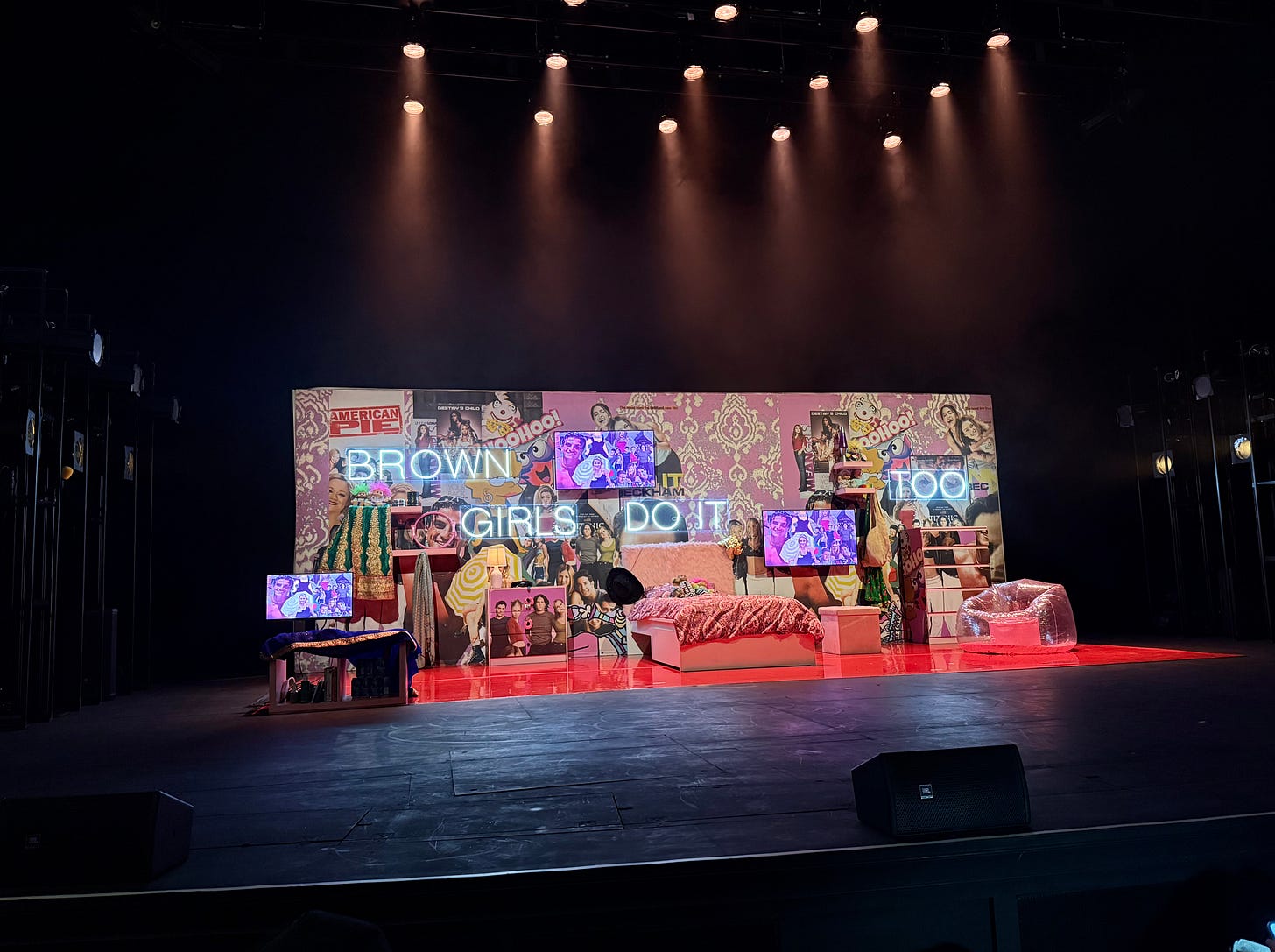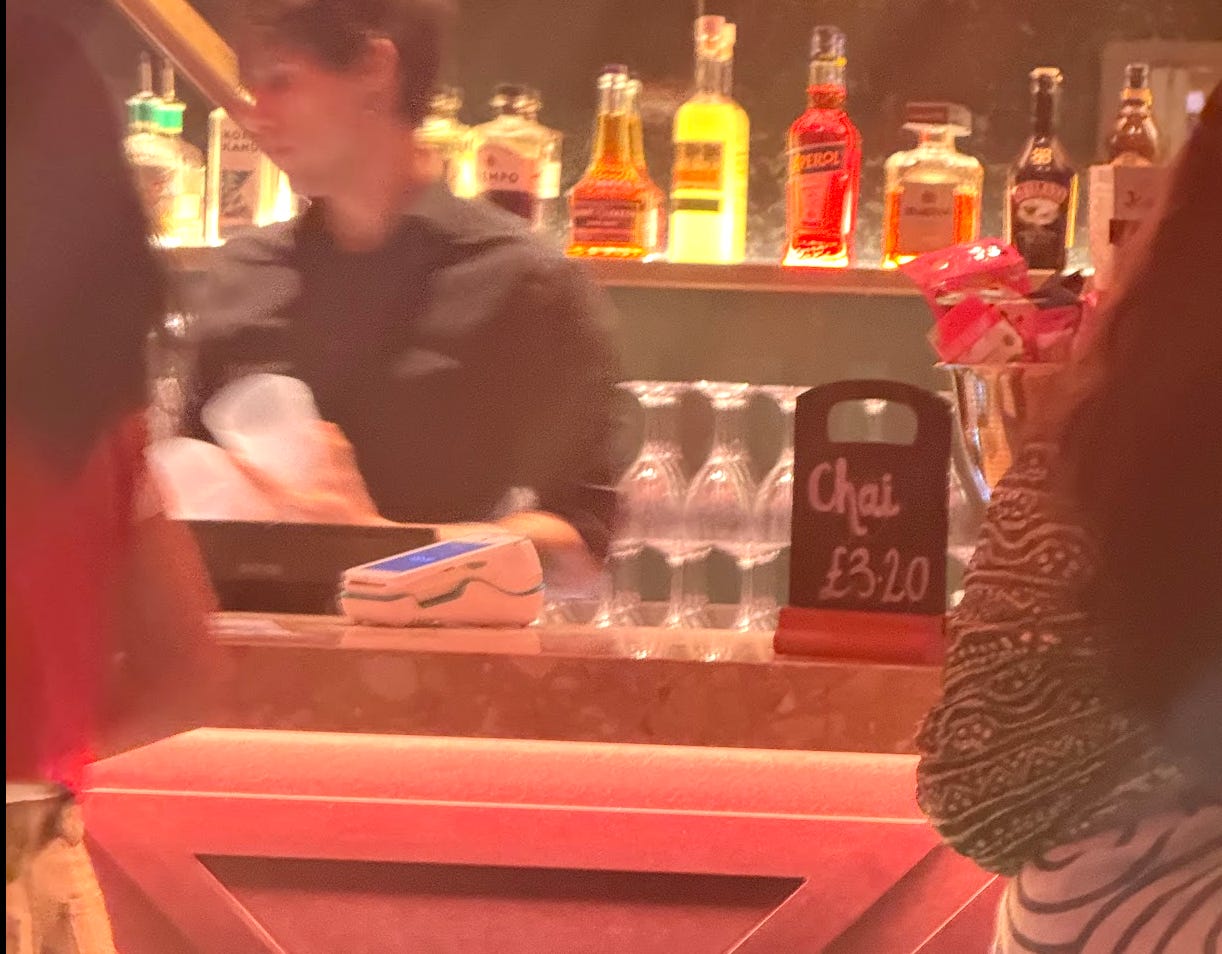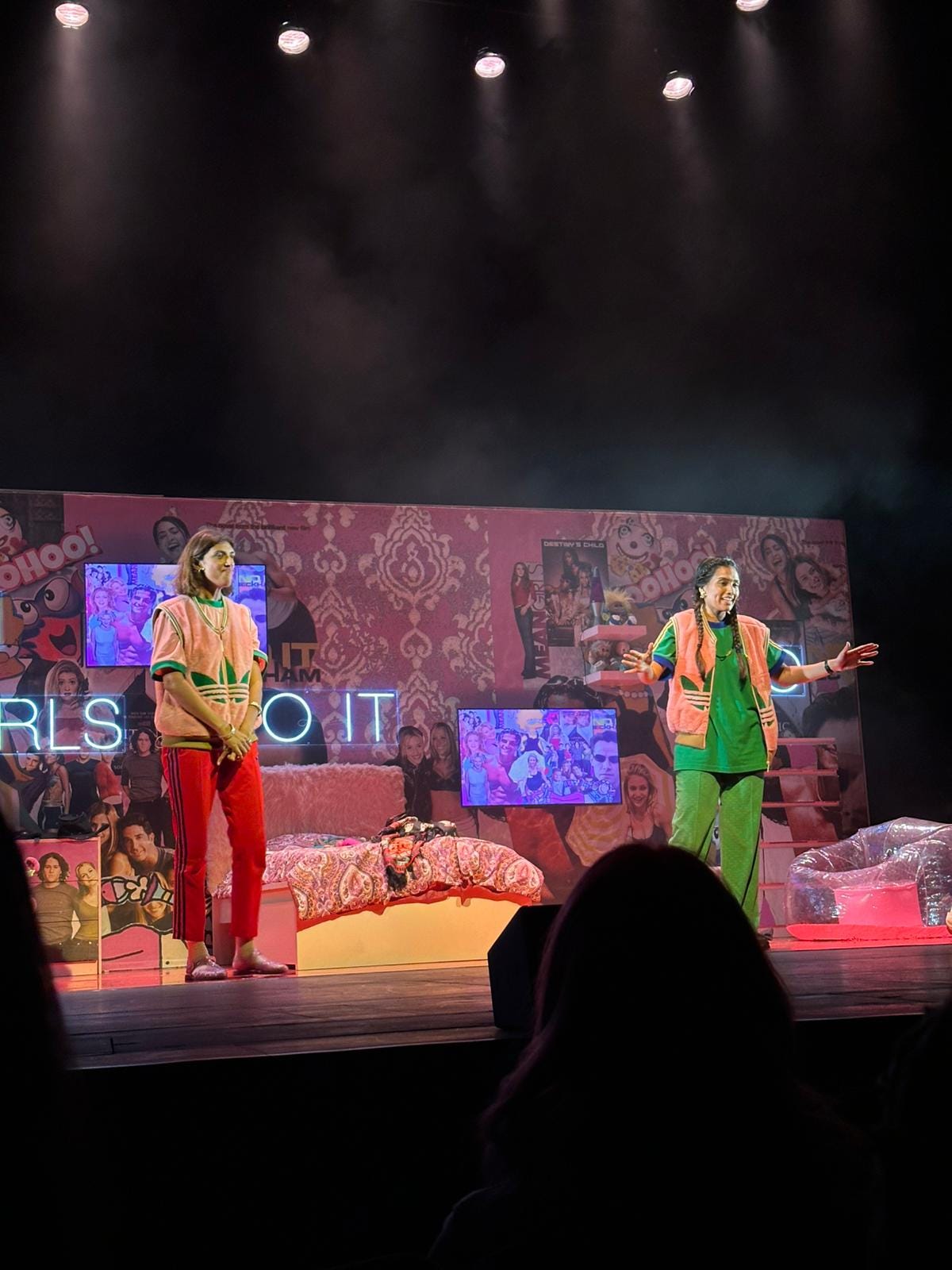Brown Girls Do It Too: The Review
Mama Told Me Not to Come at Soho Theatre
In the early summer of 2023, I traipsed down to London to Soho Theatre to watch Brown Girls Do It Too… except I didn’t have a ticket for the sold out show because of [redacted]. My plan was to try and nab a return ticket. I get there a couple of hours early and check in with the box office. They send me to the bar to relax and say they’ll get me if a ticket appears. Perfect. About 45 minutes before the show I notice a man standing by the box office. I head over to the box office who are well aware I’m first in line. So this man and I start chatting… Well, he talks at me. He’s an actor, has just come from another show, tells me he’s writing a comedy play, etc. A minute before curtains, a woman walks in announcing she’s been broken up with and has a spare ticket. This guy physically pushes me out of the way, runs up and essentially jumps on the woman. He pulls her towards the auditorium and gives me a little shrug and a wave. I look at the guy at the box office who looks as shocked as I do. And I head home.
Two years later, I’m back in London and heading to Soho Theatre Walthamstow with a good friend. I have two tickets this time.
I don’t know when I first heard about Brown Girls Do It Too but it was definitely in the era of me starting Brown Bodies. I feel like Eshaan Akbar might have been the one to put me on to it. If this is the first time you’re hearing the name, let me introduce you. Rubina Pabani and Poppy Jay are the creators and cohosts of the podcast series Brown Girls Do It Too. They started in 2019 and recorded their last episode — after six seasons — in April this year. Since episode one, where they talked about having sex for the first time, Rubina and Poppy have covered — in great depth! — their sex lives and that of their, mostly women (there is an eight-part miniseries with men) guests, explicitly and openly. They story tell, joke about, and fuck about openly. It’s been popular and well loved — them selling out, after three years of running the show, goes some way in proving that.
The theatre knows it’s about to be filled with brown people. From £3.20 chai at the bar — no, we didn’t pay for it as we actually rolled in with Chaiiwala cups in hand — to the Bollywood classics playlist, they’ve catered for the audience. And, you know what, I don’t hate it.
We take our seats to the soundtrack of our 90s and early 2000s childhoods — think Spice Girls, Backstreet Boys, Destiny’s Child and Chaiyya Chaiyya. When that last one comes on, we hear ooohs and aaahs from the entire audience. A classic. And, with that, it’s lights down for the show… And straight back up a minute later as the dynamic duo chat with the audience. As someone who doesn’t read synopses or watch trailers, I actually didn’t know the show is primarily a chit chat conversation between the pair with sketches and skits to underline their points. There’s a recurring one: Coconut Crimes Hotline — a service saving people from behaviour that is too white/not brown enough, like having a posh accent or not washing your arse. It reminds me of GCSE drama, but in the best way.
I feel like comedy is how they’ve broken the taboo of talking about sex. How else do you get such a diverse group in a room? There are brown people of all ages, white people, black people… And it’s mainly because they’re jokes together. Their rapport is excellent and you can feel how much they love each other and how much they care about Brown Girls Do It Too. That energy draws you to them and you want them to do well. Plus, they’ve got enough differences for them to cover a lot of ground: being a parent, being divorced, being posh, being working class, dating around, being monogamous, etc. This range works. The audience is laughing. I’m laughing. At one point, I have tears streaming down my face of laughter.
But — and there is a but for me — this is the lowest common denominator type of comedy like Goodness Gracious Me. Don’t get me wrong, GGM continues to be a fave. And actually, in lots of ways, we’re laughing at similar topics to the ones Goodness Gracious Me covered… Maybe just a bit raunchier. But I feel some of the jokes are written for the white gaze and not for us. Like we’re laughing at the distance we’ve travelled from culture.
I unpack this with my friend over our post show Chaiwalla chai (yes, yes, we did go before and after). Poppy and Rubina both admit in the show to not feeling comfortable in their brownness growing up and spending a lot of their lives distancing themselves from that identity. There were jokes about the perfect blonde girl at school, smelling like curry, and South Asian men dating white girls then marrying someone ‘from back home’. My friend explains her takeaway: Poppy and Rubina are drawing from their lived experiences. Hidden lives and different accents to your parents, a young marriage, finding identity outside the home… Common first generation experiences.
We have a different experience as second gen kids. My mum wasn’t born in the UK — she was but a baby when she moved. She had many of the experiences Brown Girls Do It Too draws from. Stories that aren’t mine to tell. But a mother who has grown stronger in her brownness over time, a father who fully embraced the culture, and grandparents who made me feel I belonged went a long way in ensuring my identity as ‘brown’ is one I’ve been secure in from a very young age. It helps being mixed and not growing up in the UK too — including spending some time in India where I fought to be seen as brown and not this little foreign kid.
The other factor my friend points out is that the show doesn’t touch on faith. In the context of South Asian–focused work, faith is almost always present, so it was noticeably missing for me. And I think that’s done on purpose for so many reasons but maybe that explains some of the distance I felt. My friend said that religion has brought me personally much closer to my brownness. And there is truth in that. It can definitely change who you are surrounded by and what your centre of gravity is. My faith isn’t just a belief system, it’s infrastructure. It places me in spaces where a part of my identity isn’t questioned, but reinforced. Without the community that can come with religion, I would have had to do more legwork to find ‘diverse’ communities to belong to. Or maybe that was more true a decade or two ago where it was less common to see brown people in certain spaces — and I can see how that truth might influence the show.
I expected the show to be a lot more sex centric than it was. I’m not sure if that was a choice to appeal to a wider audience or to paint a fuller picture of why Brown Girls Do It Too exists. I do wish there had been more, but I guess I would say that. There were some great bits though: I was impressed by how unashamedly they talked about masturbating as children — I thought they did that so so well. Rubina saying she would use her teddies to grind on and, after a beat, explaining her family tradition of naming teddies after the person who gifted them had the audience in tears. I also cackled when they played Never Have I Ever with the audience. We all know 90% of the room’s hands should have been up for all of it!
My highlights were their earnest moments like Poppy talking about her mum not knowing about this part of her life and her getting embarrassed about her brother being in the audience. I was drawn to Rubina talking about gentle parenting mixed race kids in this new generation, having grown up very differently, and balancing that relationship with her own mum. As they closed the show, they read letters to their mums and here wasn’t a dry eye in the house. Sex is, and remains, a topic we’re all impacted by. Whether we’re actually having sex or not isn’t the point. Aside from our love lives, it plays an important role in our confidence and the way we carry ourselves in the world, our careers, our relationship with ourselves, with our parents and family, with faith and spirituality — and, like Poppy and Rubina, interactions with our communities. Sex has been their doorway back to reclaiming their brownness through Brown Girls Do It Too — and I love that for them.
Overall, I enjoyed the show. It is obviously funny despite all of the above. And it’s funny because these experiences are based in our lives as a diaspora. Whether or not we have experienced it first hand isn’t the point — it’s one part of our communal history. The show sadly ended its 2025 run yesterday but if it returns for a fourth sell out year, I’d like to take my mum for a second opinion.
Oh and in case you’re still thinking about Chaiyya Chaiyya…
If you’ve seen the show, I’d love to hear your thoughts!





Sorry I'm not over the opening - THE STOLEN TICKET!
Sounds like a fun show! Wanted to comment on this part - 'my friend said, ‘Religion brings you closer to your brownness.’ And there is truth in that. It can definitely change who you are surrounded by and what your centre of gravity is as faith isn’t just belief, it’s infrastructure. It places you in spaces where a part of your identity isn’t questioned but reinforced.'
I'd say this definitely isn't the case for -all- South Asians in the UK. Although we'll definitely be a minority within a minority, there are those of us who don't follow any religion or have a faith based life view. Could it simply be the case that Rubina and Poppy fall into that group?